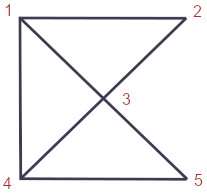The Smallest Board Games
Player one starts with pieces on 1 and 4, player two puts their pieces on 2 and 5, and the winner is the one who can blockade their opponent. It is just a minor exercise, and a game should either end quickly or go on forever. Over at Cyningstan, this game is also called Horseshoe.
A similar game from Korea, called Umul Gonu uses the same board (though in a more circular shape) but Player A starts on 1 and 2, player B on 4 and 5, and the obvious one-move win of 2-3 is forbidden.
From here we can move on to a 7-space board:
For a game called Madelinette, player A starts on 1, 3 and 6; player B starts on 2, 5 and 7, and it is another blockade game. There is an interesting dispute about whether this game had any ancient origins, or if it was created by the authors of Making Board, Peg & Dice Games by J. & J. Loader (1993).
Another 7-space game, Tsoro Yematatu, comes from Zimbabwe. The board layout is:
This time, players each have three pieces but start with no pieces on the board. They take turns adding one piece, then moving one space or jumping (but not capturing) opponent pieces, and the goal is to be the first to get three in a row.
From here, the next logical board size is the 3x3 board of tic-tac-toe game, but you would be surprised how many different games can be made out of that simple shape, depending on where the movement lines are drawn and whether you play on the lines or inside the squares. That will be a future article.
On the modern end of the spectrum, here is a game called Om that is played on a 2x2 grid, over at BoardGameGeek.
I should probably end this with the physically smallest board game that I know of. A tic-tac-toe game built out of DNA up at CalTech: here's the link.






Comments
Post a Comment